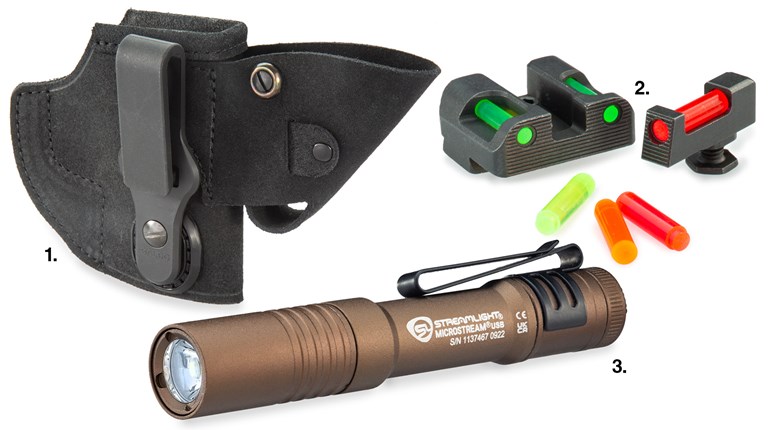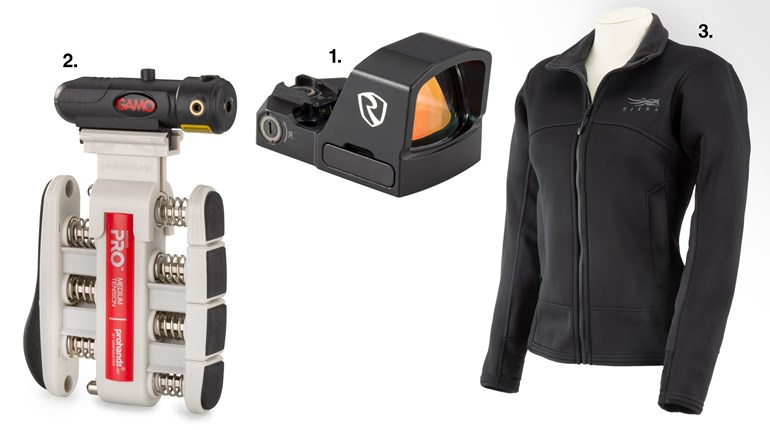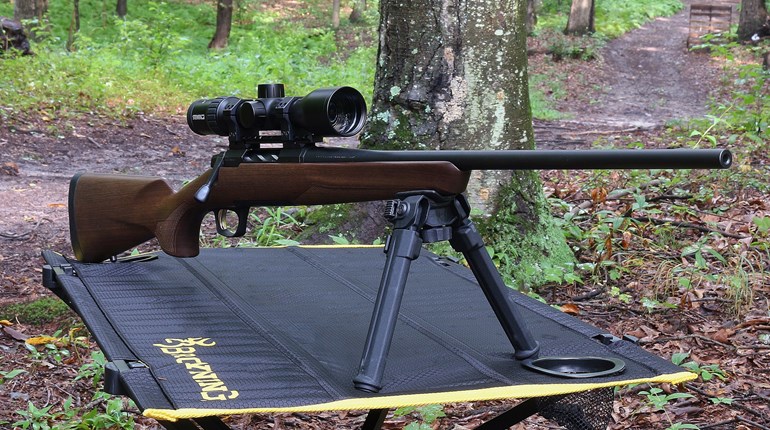
In theory at least, the worst of the Christmas hub-bub is behind us all. We hope you’re down to making memories to cherish always, and of the sort not tied to commercial things. Such can certainly be a pleasure, and especially when given. Either way, we wish you joys wrought of meaning and not merely sensation.
Right around the corner is the New Year. We expect we’re not alone in the impulse to take on something new or better (like dumping some holiday-acquired pounds, for starters!), but we’ve got two particulars in mind—be more deliberate in our training, and get back to better long gun skills. No rocket science is needed to see why we expect the Nikon LaserForce 10x42 rangefinding binos to fill the second bill, and the ShotMaxx 2 shot timer of Double Alpha Academy origin, the first.
Nikon LaserForce Rangefinding Binoculars
As we said a while back, we’re not shy in our admiration of Nikon optics. And when it comes to nailing down our better long gun performance, few things matter more than; a) seeing a target, and b) establishing the distance to that target.
The first is a sighting issue and Nikon has many solutions in that sphere (one of which you’ll see in the coming months—wink, wink) but not, per se, a binos issue. But ranging sure can be: You don’t have to be much of a rifleman or -woman to understand the implications of ballistic arc. Any shot you fire will fall to Earth. Getting it to hit the target first is the stuff of accurate range-to-target knowledge. It may not matter all that much at the range, but in the field, or more so that hunt-of-a-lifetime, it’s a huge deal.
Without quite literal surveyor’s (or other geodetic) marks, it’s still a challenge to know exactly where you’re measuring from or too.Well, spoiler alert: Few things will take by-guess-and-by-gosh out of precise ranging when you need it most like Nikon 10x42 LaserForce binoculars.
In the first place, they will range reliably out to 1900 yards—a touch over a mile (1760). This is actually a little tricky to test if you think about it: How do you get the “ground truth,” exactly? We did it with an actual paper map against which we could make precise measurements, but even here, there’s a challenge: Without quite literal surveyor’s (or other geodetic) marks, it’s still a challenge to know exactly where you’re measuring from or too, map or no.
Suffice it to say we kept the binoculars with us, and checked at every opportunity we had against a known distance that had any reason to have been measured with precision. In the end, we could find only tiny disagreements, and absolutely nothing we could confirm as error by the laser/receiver in the Nikons.
We made some fairly serious attempts to fool the system, and these came up altogether dry as well. Our highest hopes were pinned on a round building structure of corrugated surface, but even these distances were tracked and updated dutifully in real time as we scanned the surface. One of the famous ways to fool ranging systems is light-colored objects with textured surfaces—particularly like animal hides/coats that can diffuse the incoming laser beam to the point where it doesn’t return effectively—but even these came back correctly, though our sample ranges were shortish (under 300 yards).
There are plenty of other things to like about the 10x42s. One is particularly good armor. Virtually every surface that can be protected is, including optional/removable lens protection on both ends. The ranging controls were especially intuitive in our opinion, though a transit through the clear, brief manual is reassuring and helpful. Eye relief is also very forgiving. Eye cups move easily and quickly; not a factor if you follow our “Rule of Binoculars”—everyone has and uses their own. But if you want to share, or need to, users with eyeglasses and without can go back and forth readily and quickly.
This last point gets to perhaps our favorite feature—beyond the obvious—on the Nikons: Diopter adjustment for each eye is separate from focus functionality. Better still, these can be used with the binos in a viewing grip, with no concessions to adjustments that bring razor-sharp clarity (as “just” binoculars their ED glass is impressive all by itself), to say nothing of down-to-the-yard or meter accuracy with the touch of a button.
All of which gets us to a New Year’s toast: Here’s to hoping Nikon forgets where they sent these, at least for a little while longer.
Visit Nikon at www.nikonsportoptics.com
ShotMaxx 2 Watch Timer
We are noted in some circles for our style sense. Oh. Wait. We’re not noted in any circles for our style sense, but we nevertheless start off with a caveat in the genre. If the similarity between the ShotMaxx and a Patek Phillipe, or even a Gruen Curvex (for you vintage watch snobs types) doesn’t strike you, fear not: Other than time-telling, there isn’t one.

We leave you to judge who is on the losing end of that, cosmetically. But if you shoot at public ranges and especially indoors, the PP or Gruen should take a back seat to the ShotMaxx if you want to get better.
We’re huge advocates of timer training, as this sort of pressure is a capable winnower of vast flaws. Especially if your shooting is defensive/ protective, you’d better have timing goals, too: The perfect-shot-when-you-wish (versus an-acceptable-shot-when-you-must) method perishes only under the glower of actual timekeeping. Naturally, competitive shooters are already cut from such cloth, but …
… many ranges make this a truly difficult prospect—those pesky other shooters. Your timer will have little option but to record the racket of their reports right along with yours, and knowing what you did or did not get for that reload, transition or other manipulation challenge is a problem.
<<Cue triumphal theme>>
Enter the ShotMaxx 2. Duh, it’s a shot timer along traditional lines: It will beep to begin a string, record your shots via a built-in microphone and let you review strings for assessment. Par times? Yes. Multiple sensitivities? Yes. Even multiple beep frequencies. (A big help for double-pluggers, or the already-impaired of hearing). And multiple string memory? How does nine strings of up to 99 shots each sound?
Two other capacities really enticed us, however, and these are accelerometer shot sensing and what ShotMaxx calls a “Spy” mode.
The first is just plain killer when we have to train indoors. Instead of using the microphone to pick up shots—which of course records every other shot fired close by, including some echoes—the motion of your shot is sensed. .50AE or Casull booming away next door? No worries; you’ll get accurate string records of your shots, and yours only.
“Spy” mode, we concede, is simple reassurance. Here, you’ll be able to proof the timing you get from an external system and compare it to your own. Using the accelerometer to sense your first draw motion, the timer keeps track of shots in conventional fashion, but then adds string duration to reaction time you can tune (.15 to .50 seconds) to your personal quickness. Or slowness, if you’re, well, us.
As we said, the ShotMaxx is no fashion statement, and it does take a little getting used to—it’s not unfair to compare it to a ganglion cyst of some proportion. What is a fashion statement, however, are the speed and proficiency that will have fellow competitors oooooo-ing and ahhhh-ing, and less charming sorts exclaiming “holy @*&%!” as their maleficence ends a-borning. Funny how magically-appearing and coolly leveled firearms have that effect on the thoroughly rotten.
If you do decide to wear your ShotMaxx 2 off the range, you’ll be able to time their getaway, too.
Find the ShotMaxx 2 at Double Alpha Academy; $149.
Frank Winn has been studying arms and their relationship to tyranny, meaningful liberty and personal security all his adult life. He has been a firearms safety/shooting instructor for more than 20 years, and earned state, regional and national titles in several competitive disciplines.
































